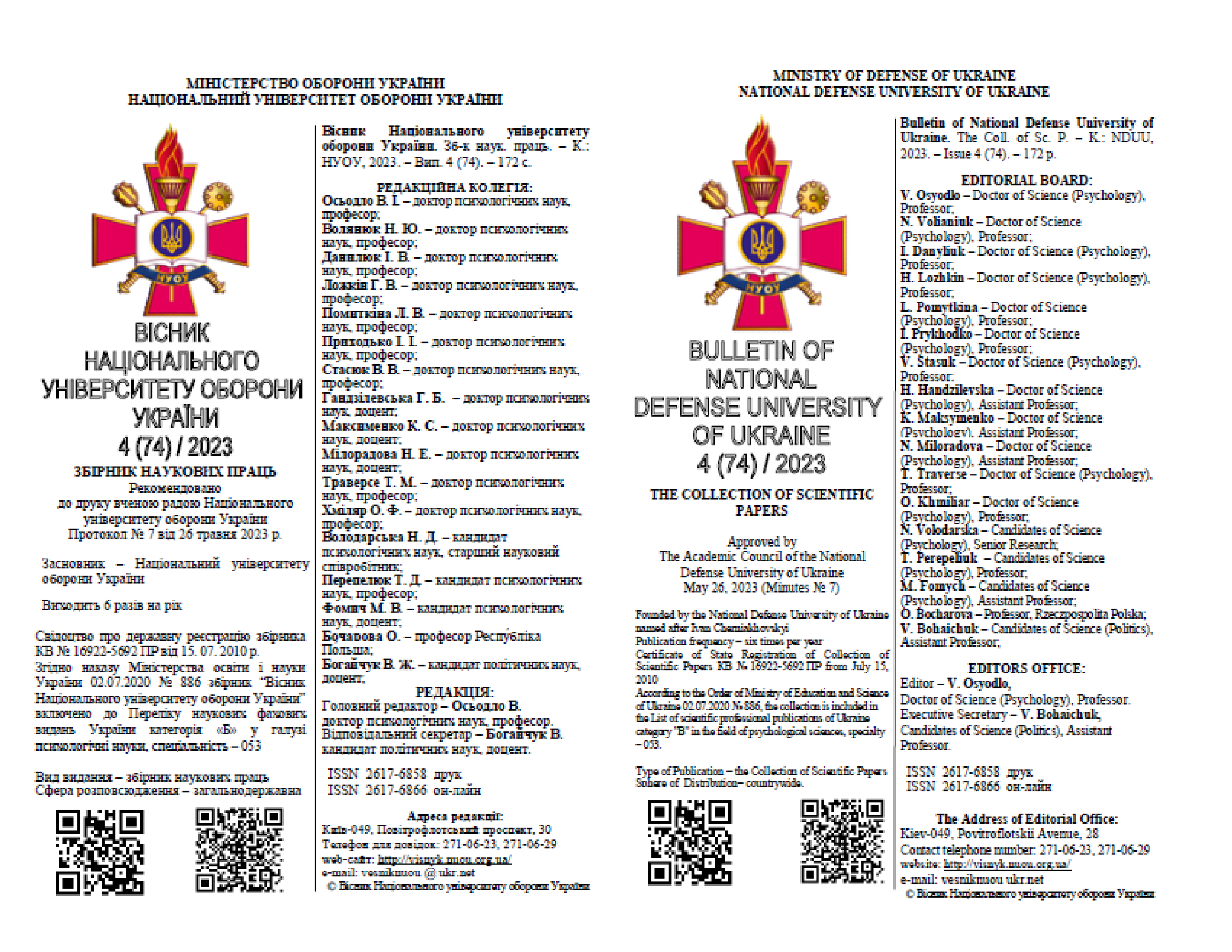КОУЧИНГОВІ ТЕХНОЛОГІЇ ЯК ЗАСІБ ПРОФІЛАКТИКИ КРИЗ ПРОФЕСІЙНОГО РОЗВИТКУ: ПРОБЛЕМА ОЦІНКИ ЕФЕКТИВНОСТІ
DOI:
https://doi.org/10.33099/2617-6858-2023-74-4-14-21Ключові слова:
коучингові технології, профілактика криз, професійний розвиток, ефективність, когнітивно-біхевіоральний підхід.Анотація
Стаття присвячена аналізу сучасних коучингових технологій як засобу профілактики криз професійного розвитку в аспекті оцінки їхньої ефективності. Зазначається, що дослідження ефективності коучингу найчастіше представлені у межах когнітивно-біхевіорального підходу, що вочевидь пов'язане із наявністю формалізованої методології. Активно розвиваються також дослідження у межах модальностей, проте дослідження ефективності ускладнюються тут значною варіативністю як процесуальних, так і побічних перемінних.
Завантаження
Посилання
Palmer S., Whybrow A. (2006) The coaching psychology movement and its development within the British Psychological Society. International Coaching Psychology Review. Vol. 1. № 1. Pр. 5-11.
Grant A. (2012) ROI is a poor measure of coaching success: towards a more holistic approach using a well-being and engagement framework. Coaching: An International Journal of Theory, Research and Practice. Vol. 5. №2. Pр. 74-85. DOI:10.1080/17521882.2012.672438
Clutterbuck D., Megginson D. (2005) Making Coaching Work: Creating a Coaching Culture. London: Chartered Institute of Personnel and Development. 180 p.
Jones R., Woods S., Guillaume Y. (2016) The effectiveness of workplace coaching: A meta-analysis of learning and performance outcomes from coaching. Journal of Occupational & Organizational Psychology. Vol. 89. №2. Pр. 249-277. DOI:10.1111/joop.12119
Leedham M. (2005) The coaching scorecard: A holistic approach to evaluating the benefits of business coaching. International Journal of Evidence Based Coaching and Mentoring. Vol. 3. №2. Pр. 30-44.
Lawrence P., Whyte A. (2014) Return on investment in executive coaching: a practical model for measuring ROI in organizations. Coaching: An International Journal of Theory, Research and Practice. Vol. 7. №1. Pр. 4-17. DOI:1 0.1080/17521882.2013.811694
Graf E-M., Dionne F. (2021) Coaching research in 2020. About destinations, journeys and travellers. International Coaching Psychology Review. Vol. 16. №2. Pр. 6-21.
Perspectives on effective coaching by those who have been coached / A.Carter, A. Blackman, B.Hicks, M.Williams, R.Hay. International Journal of Training and Development. 2017. Vol. 21. № 2. Pр. 73-91. DOI:10.1111/ijtd.12098
Analysis of executive coaching effectiveness: A study from the coachee perspective. Management Letters / E.Albizu, I.Rekalde, J.Landeta, P.Ferrín. Cuadernos de Gestión. 2019. Vol. 19. № 2. Pр. 33-52. DOI:10.5295/cdg.170876ea
Sandler K. (2011) This way out. Coaching at work. Vol. 6. №6. Pр. 3135.
Palmer S., Whybrow A. (eds.) (2019) Handbook of coaching psychology. A guide for practitioners. New York: Routledge. 599 p.
Neenan M., Palmer S. (2012) Cognitive behavioural coaching in practice: An evidence-based approach. London: Routledge. 272 p. DOI:10.4324/9780203144404
Skews R., Palmer S. (2021) Coaching psychology approaches and models. In O’Riordan S., Palmer S. (eds.), Introduction to Coaching Psychology. London: Routledge. 248 p.
Edgerton N., Palmer S. (2005) SPACE: A psychological model for use within cognitive behavioural coaching, therapy and stress management. The Coaching Psychologist. Vol. 2. № 2. Pр. 25-31.
Grant A. (2014) The efficacy of executive coaching in times of organisational change. Journal of Change Management. Vol. 14. №2. Pр. 258-280. DOI:10.1080/14697017.2013.805159
Bozer G., Sarros J. (2012) Examining the effectiveness of executive coaching on coachees’ performance in the Israeli context [Электронный ресурс] // International Journal of Evidence Based Coaching and Mentoring. Vol. 10. №1. Pр. 1432. URL: https://psycnet.apa.org/record/2012-08455-003 (дата обращения: 01.03.2022).
David O. (2019) REBT in coaching // Advances in REBT: Theory, practice, research, measurement, prevention and promotion / Eds. M.E. Bernard, W. Dryden. Springer Nature Switzerland AG. Pр. 267-287. DOI:10.1007/978-3-319-93118-0_12
Handbook of coaching psychology. A guide for practitioners / Ed. S.Palmer, A.Whybrow. New York: Routledge, 2019. 599 p.
Palmer S., Whybrow A. (2019) Handbook of Coaching Psychology. London: Routledge. 599 p. DOI:10.4324/9781315820217
David O., Ionicioiu I., Imbarus C., Sava F. (2016) Coaching banking managers through the financial crisis: Effects on stress, resilience, and performance. Journal of Rational-Emotive and Cognitive-Behavioral Therapy. Vol. 34, no. 4, pp. 267-281. DOI:10.1007/s10942-016-0244-0
Krebs P., Norcross J., Nicholson J., Prochaska J. (2019) Stages of Change. In Norcross J.C., Wampold B.E. (eds.), Psychotherapy relationships that work: Evidence-based therapist responsiveness / Eds. J.C. Norcross, B.E. Wampold. Oxford University Press. Pр. 296-328. DOI:10.1093/med-psych/9780190843960.003.0010
Grant A. (2010) It takes time: A stages of change perspective on the adoption of workplace coaching skills. Journal of Change Management. Vol. 10. №1. Pр. 61-77. DOI:10.1080/14697010903549440
Berg I., De Jong P. (2002) Interviewing for solutions. California: Brooks/Cole. 336 p.
More Than Miracles: The State of the Art of Solution-Focused Brief Therapy / S.Shazer, Y.Dolan, H.Korman, T.Trepper, E.Mccollum, I.Berg. New York: Routledge, 2021. 200 p.
Christopoulou G. (2018) The Psychodynamic Approach to Executive Coaching. Journal of Regional Socio-Economic Issues. Vol. 8. Special Issue 1. Pр. 39-45.
##submission.downloads##
Опубліковано
Як цитувати
Номер
Розділ
Ліцензія
Авторське право (c) 2023 Вісник Національного університету оборони України

Ця робота ліцензується відповідно до Creative Commons Attribution-NonCommercial-ShareAlike 4.0 International License.





